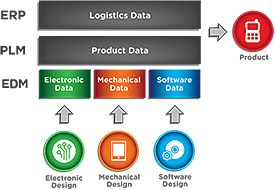Integrating with the enterprise
Within the electronics industry, the engineering and business infrastructure typically consists of three main information platforms to define, design, release, build and maintain products throughout their lifecycle:

1) ERP (Enterprise Resource Planning) – Defines the company’s management and execution system for resources, logistics, finances and production.
EDX enables transfer of information such as component data (i.e. logistics data, supplier information, company-specific part numbers, etc.) or part request information between the ERP system and the PCB design flow.
2) PLM (Product Lifecycle Management) – Defines the company’s management system for the product definition and configuration. The complete end product is described by data sets from electrical, mechanical and software engineering. The PLM system provides management of these configurations throughout the bidding, release, production and service process across the entire product lifecycle.
EDX enables transfer of PCB design data into the PLM system. This might include Part Lists/BOMs, design data, and the necessary manufacturing data that is recorded by the PLM. Additionally EDX can capture and exchange the data necessary to drive ECO processes, a process often initiated within the PLM. Some PLMs also administer part requests, and EDX provides a common data format to exchange this information with the PCB librarians.
3) EDM (Engineering Data Management) – Defines the company’s work-in-process data for electrical or mechanical development in dedicated applications. EDM provides the environment for managing work in progress design and library data for electronics hardware / PCB design. This includes the management of IP reuse within the PCB design environment. The EDM system ensures the integrity of the design data during the design phase.
Reliable data exchange between EDM and PLM as well as with other 3rd party tools is necessary specifically for the following tasks:
- Augment technical data in the component library with the relevant business information
- Upload design and manufacturing objects to PLM for archiving and production purposes
- Upload parts lists to PLM for review and purchasing
- Support review and approval processes through viewable objects that do not require access to the native authoring tools
- Support for an integrated design change process
EDX for EDM systems would typically share work-in-progress data such as library data, design snapshots or part lists, as well as viewable files such as ODB++ or PDFs. EDX supports bi-directional data exchange from EDMs to enterprise systems to enable effective product lifecycle management while protecting the integrity of the design and library data.
Read more about business drivers.

